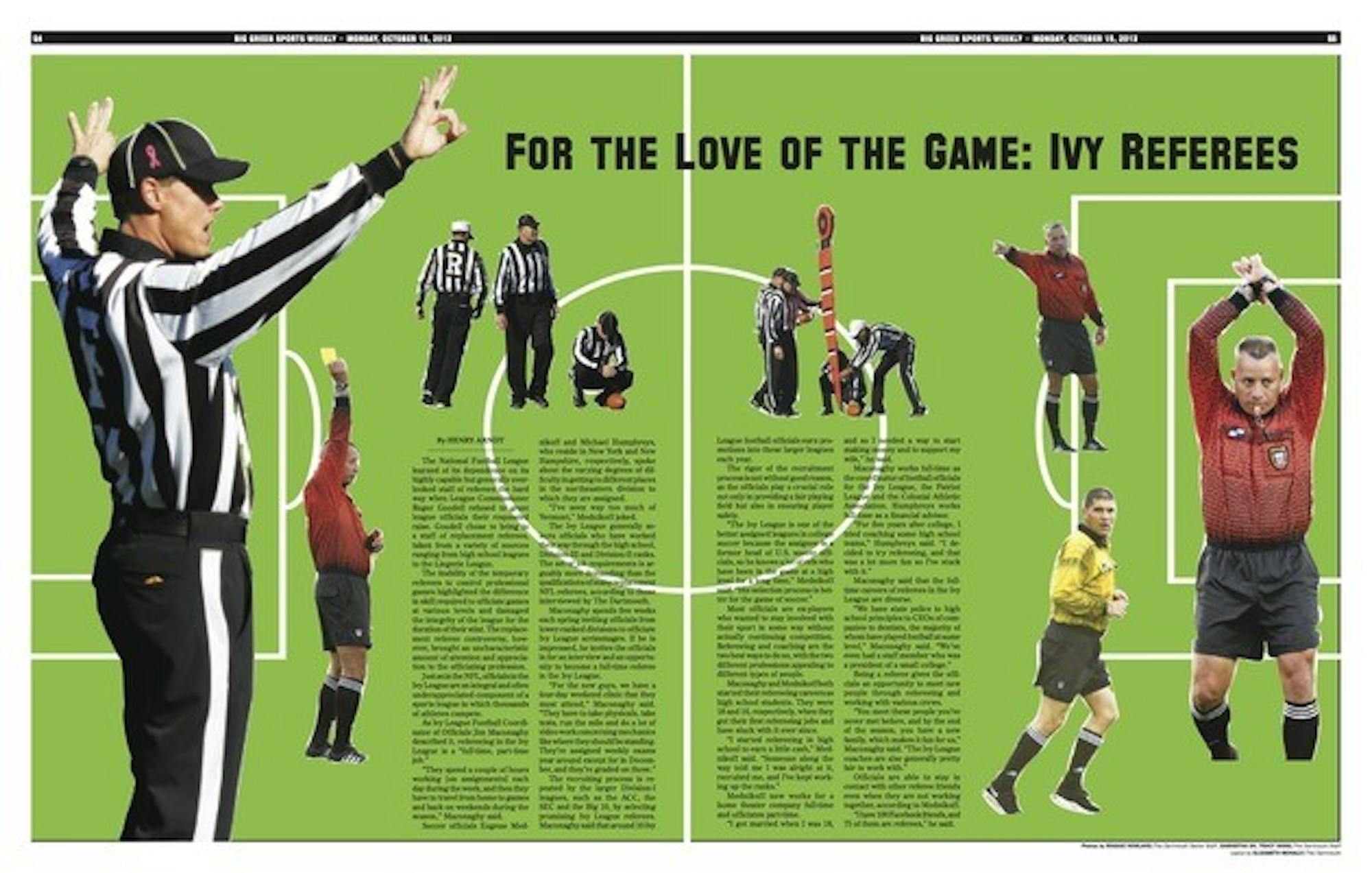The inability of the temporary referees to control professional games highlighted the difference in skill required to officiate games at various levels and damaged the integrity of the league for the duration of their stint. The replacement referee controversy, however, brought an uncharacteristic amount of attention and appreciation to the officiating profession.
Just as in the NFL, officials in the Ivy League are an integral and often underappreciated component of a sports league in which thousands of athletes compete.
As Ivy League Football Coordinator of Officials Jim Maconaghy described it, refereeing in the Ivy League is a "full-time, part-time job."
"They spend a couple of hours working [on assignments] each day during the week, and then they have to travel from home to games and back on weekends during the season," Maconaghy said.
Soccer officials Eugene Mednikoff and Michael Humphreys, who reside in New York and New Hampshire, respectively, spoke about the varying degrees of difficulty in getting to different places in the northeastern division to which they are assigned.
"I've seen way too much of Vermont," Mednikoff joked.
The Ivy League generally selects officials who have worked their way through the high school, Division-III and Division-II ranks. The set of job requirements is arguably more demanding than the qualifications of many replacement NFL referees, according to those interviewed by The Dartmouth.
Maconaghy spends five weeks each spring inviting officials from lower-ranked divisions to officiate Ivy League scrimmages. If he is impressed, he invites the officials in for an interview and an opportunity to become a full-time referee in the Ivy League.
"For the new guys, we have a four-day weekend clinic that they must attend," Maconaghy said. "They have to take physicals, take tests, run the mile and do a lot of video work concerning mechanics like where they should be standing. They're assigned weekly exams year around except for in December, and they're graded on those."
The recruiting process is repeated by the larger Division-I leagues, such as the ACC, the SEC and the Big 10, by selecting promising Ivy League referees. Maconaghy said that around 10 Ivy League football officials earn promotions into these larger leagues each year.
The rigor of the recruitment process is not without good reason, as the officials play a crucial role not only in providing a fair playing field but also in ensuring player safety.
"The Ivy League is one of the better assigned leagues in college soccer because the assigner is a former head of U.S. soccer officials, so he knows a lot of refs who have been in the game at a high level for a long time," Mednikoff said. "His selection process is better for the game of soccer."
Most officials are ex-players who wanted to stay involved with their sport in some way without actually continuing competition. Refereeing and coaching are the two best ways to do so, with the two different professions appealing to different types of people.
Maconaghy and Mednikoff both started their refereeing careers as high school students. They were 18 and 16, respectively, when they got their first refereeing jobs and have stuck with it ever since.
"I started refereeing in high school to earn a little cash," Mednikoff said. "Someone along the way told me I was alright at it, recruited me, and I've kept working up the ranks."
Mednikoff now works for a home theater company full-time and officiates part-time.
"I got married when I was 18, and so I needed a way to start making money and to support my wife," he said.
Maconaghy works full-time as the coordinator of football officials for the Ivy League, the Patriot League and the Colonial Athletic Association. Humphreys works full-time as a financial advisor.
"For five years after college, I tried coaching some high school teams," Humphreys said. "I decided to try refereeing, and that was a lot more fun so I've stuck with it."
Maconaghy said that the full-time careers of referees in the Ivy League are diverse.
"We have state police to high school principles to CEOs of companies to dentists, the majority of whom have played football at some level," Maconaghy said. "We've even had a staff member who was a president of a small college."
Being a referee gives the officials an opportunity to meet new people through refereeing and working with various crews.
"You meet these people you've never met before, and by the end of the season, you have a new family, which makes it fun for us," Maconaghy said. "The Ivy League coaches are also generally pretty fair to work with."
Officials are able to stay in contact with other referee friends even when they are not working together, according to Mednikoff.
"I have 100 Facebook friends, and 75 of them are referees," he said.




